|
|
|
Sort Order |
|
|
|
Items / Page
|
|
|
|
|
|
|
| Srl | Item |
| 1 |
ID:
105246
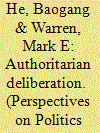

|
|
|
|
|
| Publication |
2011.
|
| Summary/Abstract |
Authoritarian rule in China is now permeated by a wide variety of deliberative practices. These practices combine authoritarian concentrations of power with deliberative influence, producing the apparent anomaly of authoritarian deliberation. Although deliberation is usually associated with democracy, they are distinct phenomena. Democracy involves the inclusion of individuals in matters that affect them through distributions of empowerments such as votes and rights. Deliberation is a mode of communication involving persuasion-based influence. Combinations of non-inclusive power and deliberative influence-authoritarian deliberation-are readily identifiable in China, probably reflecting failures of command authoritarianism under the conditions of complexity and pluralism produced by market-oriented development. The concept of authoritarian deliberation frames two possible trajectories of political development in China: the increasing use of deliberative practices stabilizes and strengthens authoritarian rule, or deliberative practices serve as a leading edge of democratization.
|
|
|
|
|
|
|
|
|
|
|
|
|
|
|
|
| 2 |
ID:
154150


|
|
|
|
|
| Summary/Abstract |
Authoritarian rule in China increasingly involves a wide variety of deliberative practices. These practices combine authoritarian command with deliberative influence, producing the apparent anomaly of authoritarian deliberation. Although deliberation and democracy are usually found together, they are distinct phenomena. Democracy involves the inclusion of individuals in matters that affect them through distributions of empowerments like votes and rights. Deliberation is the kind of communication that involves persuasion-based influence. Combinations of command-based power and deliberative influence – like authoritarian deliberation – are now pervading Chinese politics, likely a consequence of the failures of command authoritarianism under the conditions of complexity and pluralism produced by market-oriented development. The concept of authoritarian deliberation frames two possible trajectories of political development in China. One possibility is that the increasing use of deliberative practices stabilizes and strengthens authoritarian rule. An alternative possibility is that deliberative practices serve as a leading edge of democratization.
|
|
|
|
|
|
|
|
|
|
|
|
|
|
|
|
| 3 |
ID:
160608
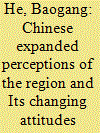

|
|
|
|
|
| Summary/Abstract |
The existing literature on the Indo-Pacific has largely focused on how and why the USA, Japan, Australia, India, and Indonesia have promoted the strategic concept of the Indo-Pacific, and how China has rejected it in the domain of maritime security. What has been overlooked, however, are dramatically expanded Chinese perceptions of the region and changing and complex Chinese attitudes and responses toward the Indo-Pacific. This essay aims to fill this gap by demonstrating how China has coopted certain components of the Indo-Pacific in its geoeconomic hegemonic project. This can be partially explained by unfolding and expanding Chinese perceptions of the region, characterized by geoeconomics and maritime/continental hybridity. This paper brings a missing perspective to the debate by highlighting China’s evolving, complex, and multifaceted approaches regarding the Indo-Pacific. It also offers a conceptual tool of a hybrid vision of the institutionalization of the Indo-Pacific for the enterprise of regional cooperation.
|
|
|
|
|
|
|
|
|
|
|
|
|
|
|
|
| 4 |
ID:
130164
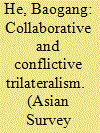

|
|
|
|
|
| Publication |
2014.
|
| Summary/Abstract |
This paper provides a critical overview of Australian, Chinese, and American perspectives on trilatesralim, with a detailed discussion of Australian debates on the matter. Its aim is to trace the evolution of the changing discourse on the rise of China, examine major debates in Australia, and provide both an intellectual background and an overview for this special issue.
|
|
|
|
|
|
|
|
|
|
|
|
|
|
|
|
| 5 |
ID:
098864


|
|
|
|
|
| Publication |
2010.
|
| Summary/Abstract |
This paper reviews and compares three deliberative approaches to conflict, and applies the deliberative approach to the Tibet issue. It examines the case of a deliberative workshop, its achievements and limits. Deliberative dialogue appears to have improved knowledge and mutual understanding, enhanced mutual trust and deliberative capacities, and produced moderating effects.
|
|
|
|
|
|
|
|
|
|
|
|
|
|
|
|
| 6 |
ID:
006912
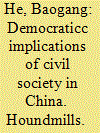

|
|
|
|
|
| Publication |
Houndmills, Macmillan, 1997.
|
| Description |
xi,212p.
|
| Standard Number |
033373670
|
|
|
|
|
|
|
|
|
|
|
|
Copies: C:1/I:0,R:0,Q:0
Circulation
| Accession# | Call# | Current Location | Status | Policy | Location |
| 038823 | 322.440951/HE 038823 | Main | On Shelf | General | |
|
|
|
|
| 7 |
ID:
163659
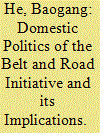

|
|
|
|
|
| Summary/Abstract |
Within the Belt and Road Initiative literature, as well as in the media more broadly, geopolitical and geostrategic analyses have largely undervalued a role for domestic politics analyses. This article seeks to redress this deficiency, and supplements geopolitical analyses with a domestic politics perspective. It brings back the centrality of domestic politics. The domestic politics approach pays attention to the influence of personal leadership on the BRI and focuses on the political mobilisation and control mechanisms of the BRI, their impact and the various entanglements of international relations and domestic politics.
|
|
|
|
|
|
|
|
|
|
|
|
|
|
|
|
| 8 |
ID:
079510
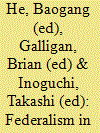

|
|
|
|
|
| Publication |
Cheltenham, Edward Elgar, 2007.
|
| Description |
xxi, 329p.
|
| Standard Number |
9781847201409
|
|
|
|
|
|
|
|
|
|
|
|
Copies: C:1/I:0,R:0,Q:0
Circulation
| Accession# | Call# | Current Location | Status | Policy | Location |
| 052885 | 320.45049/HE 052885 | Main | On Shelf | General | |
|
|
|
|
| 9 |
ID:
095557
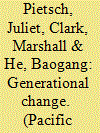

|
|
|
|
|
| Publication |
2010.
|
| Summary/Abstract |
The Australian Prime Minister Kevin Rudd has recently announced plans to develop greater regional integration and cooperation in the Asia-Pacific region. Historically, Australian opinion, however, has expressed some anxiety about forging closer economic, political and security ties with Asia. Using trend data from the Australian Election Study and the Lowy Institute Poll, this article examines changes in Australian public opinion on closer engagement with Asia and whether the Australian public is likely to support the Rudd government's push towards developing deeper regional diplomacy. The article finds a shift in opinion since the 1990s with a younger generation of voters who are moderately supportive of Australia's engagement with Asia.
|
|
|
|
|
|
|
|
|
|
|
|
|
|
|
|
| 10 |
ID:
130162
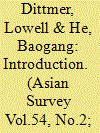

|
|
|
|
|
| Publication |
2014.
|
| Summary/Abstract |
IN THE PAST 20 YEARS, CHINA HAS RISEN to become the second largest economic power in the world. Its GDP surpassed that of Canada in 1993, Italy in 2000, France in 2005, the U.K. in 2006, Germany in 2008, and Japan in 2009. In 2012 it surpassed the United States as the world's largest trading nation (the U.S. remains the largest importer). China is now the number one trading partner of Australia, Japan, South Korea, and the ?rst or second trading partner of the 10 nations in the Association of Southeast Asian Nations (ASEAN), not counting the EU. Growing economic dependence upon China, however, raises long-term security issues for all Asian trade partners, given their strategic proximity to ambitious China. This is also true for Australia, just 200 kilometers from Indonesia at their closest points. Canberra, unable to shore up a security guarantee from Beijing, has increased its purchase in the security insurance policies of Washington.
|
|
|
|
|
|
|
|
|
|
|
|
|
|
|
|
| 11 |
ID:
083440


|
|
|
| 12 |
ID:
046450
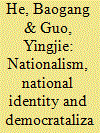

|
|
|
|
|
| Publication |
Aldershot, Ashgate, 2000.
|
| Description |
xviii, 240p.
|
| Standard Number |
1840147806
|
|
|
|
|
|
|
|
|
|
|
|
Copies: C:1/I:0,R:0,Q:0
Circulation
| Accession# | Call# | Current Location | Status | Policy | Location |
| 045118 | 320.540951/HE 045118 | Main | On Shelf | General | |
|
|
|
|
| 13 |
ID:
078510
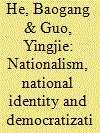

|
|
|
|
|
| Publication |
Aldershot, Ashgate Publishing Ltd, 2000.
|
| Description |
xvii, 240p.
|
| Standard Number |
1840147806
|
|
|
|
|
|
|
|
|
|
|
|
Copies: C:1/I:0,R:0,Q:0
Circulation
| Accession# | Call# | Current Location | Status | Policy | Location |
| 042474 | 320.540951/HE 042474 | Main | On Shelf | General | |
|
|
|
|
| 14 |
ID:
073846
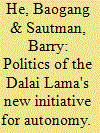

|
|
|
|
|
| Publication |
2005.
|
| Summary/Abstract |
In the late 1980s, the Dalai Lama first asserted that he was willing to no longer press for an independent Tibet. Until recently, however, scant progress was made toward negotiations between the Tibetan exiles and the government of the People's Republic of China: the PRC had shown no inclination to negotiate about matters beyond the Dalai Lama's own status, while the exiles had insisted that China renounce all control over affairs in Tibet, except foreign affairs and defense. In 2002, largely in response to external pressures, China invited one of the Dalai Lama's brothers to visit Tibet and in 2002-2005 the Dalai Lama's representatives have visited Tibetan areas of China on three occasions and, most recently, have met with PRC representatives in Switzerland. The Dalai Lama has since gone some way toward accommodating PRC pre-conditions for negotiations. He has acknowledged that Tibet is part of China and Tibetan culture part of Chinese culture, as well as refocusing his concerns away from political demands to questions of cultural and religious autonomy. Formidable obstacles to negotiations remain, including exile demands that they be about unification of all PRC Tibetan areas and the establishment of liberal democracy in Tibet. Compromise solutions are available, however, and China can take a number of steps that would facilitate acceptance of compromise in the exile community and that would substantially benefit Tibetans in Tibet.
|
|
|
|
|
|
|
|
|
|
|
|
|
|
|
|
| 15 |
ID:
082519
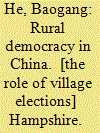

|
|
|
|
|
| Publication |
Hampshire, Palgrave Macmillan, 2007.
|
| Description |
xii, 275p.
|
| Standard Number |
9780230600164
|
|
|
|
|
|
|
|
|
|
|
|
Copies: C:1/I:0,R:0,Q:0
Circulation
| Accession# | Call# | Current Location | Status | Policy | Location |
| 053644 | 324.9510091734/HE 053644 | Main | On Shelf | General | |
|
|
|
|
| 16 |
ID:
075164
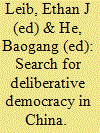

|
|
|
|
|
| Publication |
Hampshire, Palgrave Macmillan, 2006.
|
| Description |
vi, 288p.
|
| Standard Number |
1403974160
|
|
|
|
|
|
|
|
|
|
|
|
Copies: C:1/I:0,R:0,Q:0
Circulation
| Accession# | Call# | Current Location | Status | Policy | Location |
| 051963 | 320.951/LIE 051963 | Main | On Shelf | General | |
|
|
|
|
| 17 |
ID:
183510


|
|
|
|
|
| Summary/Abstract |
As China grows in international importance and influence, more and more countries worry about how it will behave, and are preoccupied with the hard question of how to tame it. As a middle power Australia has sought ways to influence the thinking and behaviour of Chinese policymakers. The Australian approach to taming China represents an academically puzzling and politically intriguing case, which, unfortunately, has not been studied in detail. The paper has argued that the concept of taming offers significant intellectual advantages in its reconsideration of Australia’s China policy and has called for Australian scholars and policymakers, to critically rethink unspoken and understudied Australia’s taming practices and policies. To this end, this paper has proposed an experience-based theory of taming as a key research agenda.
|
|
|
|
|
|
|
|
|
|
|
|
|
|
|
|
|
|
|
|
|